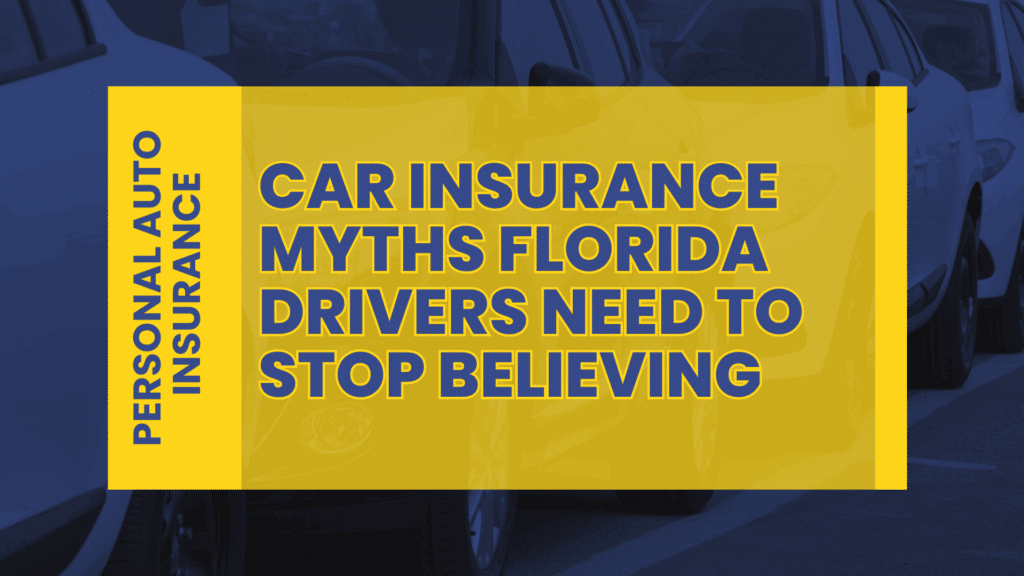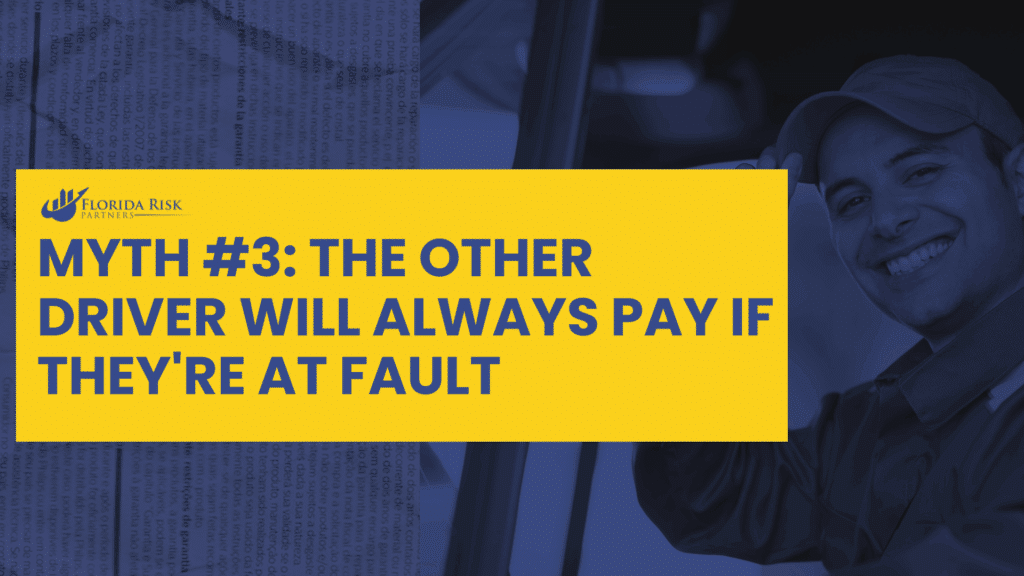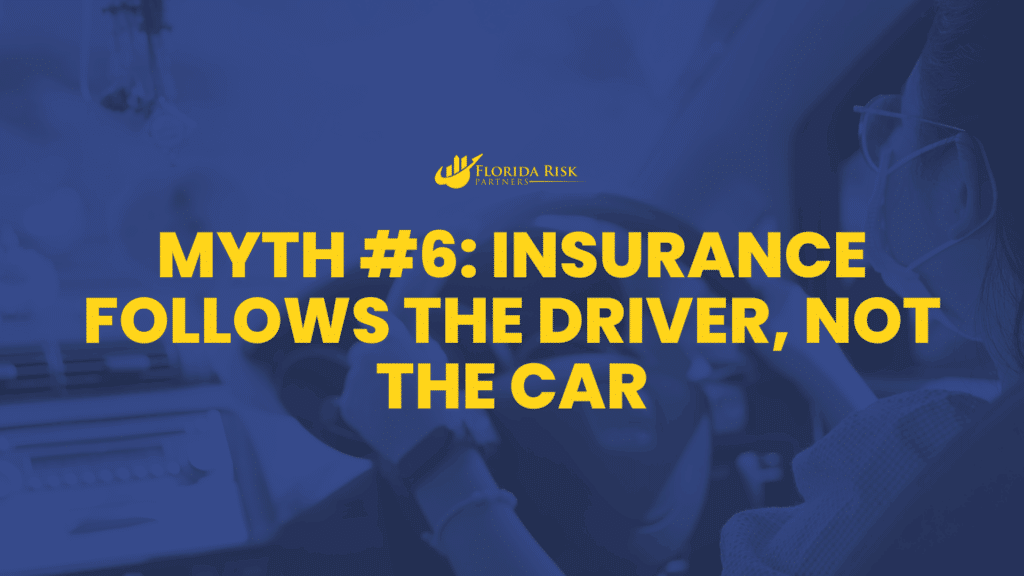-
Main Office: 1434 E. Bloomingdale Ave Valrico, FL 33596-6110
-
Phone: (888) 601-6660
-
Email: info@floridariskpartners.com

Debunking the Most Common Misconceptions About Auto Coverage
When it comes to car insurance, misinformation is everywhere. From viral social media posts to outdated advice from well-meaning friends, it’s easy to believe things that simply aren’t true—especially in a state like Florida, where the insurance system is already complex.
In this post, we’re setting the record straight. Let’s bust some of the most common Florida car insurance myths so you can avoid costly mistakes and make more informed decisions about your coverage.
Myth #1: Red Cars Cost More to Insure
Let’s put this one to rest: your car’s color has absolutely no impact on your insurance rate. It doesn’t matter if your car is red, black, neon green, or zebra-striped—insurers don’t factor paint color into your premium.
What does matter? The make, model, year, engine size, repair costs, and safety features of the vehicle. So while a flashy sports car may cost more to insure, it has nothing to do with the color—it’s all about performance risk and replacement value.
Want to know what really affects your premium? Check out our guide to the 7 key factors that impact Florida auto insurance rates.
Myth #2: Full Coverage Means “Everything Is Covered”
“Full coverage” is one of the most misunderstood terms in the insurance world. It sounds like a policy that covers everything—but it doesn’t.
In reality, full coverage typically refers to a policy that includes:
- Liability coverage (for damage and injuries you cause to others)
- Comprehensive coverage (for non-collision events like theft, fire, flood, and storms)
- Collision coverage (for damage to your car in an at-fault accident)
But even this combination doesn’t cover every scenario. For example, full coverage won’t pay for:
- Mechanical breakdowns or routine maintenance
- Items stolen from inside your car (those fall under homeowners or renters insurance)
- Accidents when using your car for business or delivery services, unless you have commercial coverage
Need help understanding what each part of your policy actually covers? Download our Florida Auto Coverage Planner.
Myth #3: The Other Driver Will Always Pay If They’re at Fault

Florida is a no-fault state, which means your own insurance pays for your injuries—regardless of who caused the accident. Specifically, Personal Injury Protection (PIP) coverage pays for your medical expenses up to $10,000, even if the other driver was clearly at fault.
If your injuries exceed PIP limits and the at-fault driver has Bodily Injury Liability (BIL) coverage, you may be able to recover additional damages. But here’s the problem: Florida doesn’t require BIL, so many drivers don’t carry it.
That’s why it’s critical to have Uninsured/Underinsured Motorist (UM/UIM) coverage. It protects you when the other driver can’t—or won’t—pay. Read our full guide to UM coverage in Florida to learn how it works.
Myth #4: Minimum Coverage Is Enough If You’re a Safe Driver
Carrying just the state minimum coverage might keep you legal, but it won’t necessarily keep you protected.
Florida requires:
- $10,000 in Personal Injury Protection (PIP)
- $10,000 in Property Damage Liability (PDL)
But these limits are often insufficient in real-world accidents. For example, if you total someone’s $35,000 vehicle and only have $10,000 in property damage coverage, you could be sued personally for the difference.
Even if you’re a safe driver, you can’t control other people on the road—or the severity of a crash. That’s why we recommend increasing your liability limits and carrying full coverage if you want meaningful protection.
Not sure if you’re underinsured? Schedule a free policy review with our team and get clarity in just a few minutes.
Myth #5: My Credit Score Doesn’t Affect My Insurance Rate
In Florida, it does.
Many drivers are surprised to learn that insurance companies use credit-based insurance scores to help predict the likelihood of filing a claim. While it’s not the same score used for loans or credit cards, it is based on similar factors—like payment history and outstanding debt.
Drivers with poor credit may pay significantly more than those with good credit, even with identical driving records. So improving your credit can be an effective way to lower your premium over time.
Learn more about how insurers set your rate in our Week 3 breakdown of car insurance pricing in Florida.
Myth #6: Insurance Follows the Driver, Not the Car

This is a half-truth that can lead to major confusion. In most cases, auto insurance in Florida follows the car, not the person driving it.
So if you loan your car to a friend and they get into an accident, it’s your policy that typically pays first—not theirs. That’s why it’s important to be cautious about who you allow to drive your vehicle.
There are exceptions, of course—such as when a non-listed driver is excluded from your policy—but as a general rule, coverage is tied to the vehicle.
Myth #7: Once I Have Insurance, I’m Set for the Year
Too many drivers treat their insurance policy as “set it and forget it.” But your coverage should evolve as your life changes.
Here are a few reasons to review your policy regularly:
- You’ve moved to a new ZIP code
- You’ve paid off your car loan
- You’ve added or removed a vehicle
- You now drive fewer miles (especially if you work from home)
- You’ve improved your credit score
- You’ve gotten married or had a teen driver added to the policy
Reviewing your coverage at least once a year—and especially at renewal—is one of the best ways to make sure you’re not overpaying or underinsured.
Need help reviewing your policy? Schedule a no-obligation consultation with our insurance team and we’ll walk you through it.
Don’t Let Myths Cost You Money
The wrong assumptions about car insurance can lead to costly coverage gaps, denied claims, or unnecessarily high premiums. The more you understand your policy, the better you’ll be able to make decisions that protect your vehicle, your finances, and your peace of mind.
Coming Next Week: Build Your Annual Insurance Checkup Plan
In the final week of our series, we’ll tie everything together and help you create an easy-to-follow insurance checkup process to review your policy, avoid surprises, and prepare for renewal season like a pro.
Call Us Or
Schedule an Appointment
Select an agent below to view our online calendars and select a day and time that works best for you or call us directly at 888-601-6660. When you use our online calendars, you will receive an email with more information.



